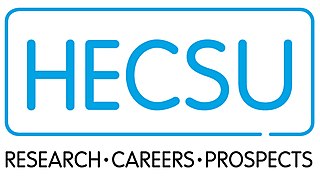
Janet is a high-speed network for the UK research and education community provided by Jisc, a not-for-profit company set up to provide computing support for education. It serves 18 million users and is the busiest National Research and Education Network in Europe by volume of data carried. JANET was previously a private, UK government-funded organisation, which provided the Janet computer network and related collaborative services to UK research and education.
The Higher Education Funding Council for England (HEFCE) was a non-departmental public body in the United Kingdom, which was responsible for the distribution of funding for higher education to universities and further education colleges in England since 1992. It ceased to exist as of 1 April 2018, when its duties were divided between the newly created Office for Students and Research England.
The National Learning Network (NLN) was a UK national partnership programme designed to increase the uptake of Information Learning Technology (ILT) across the learning and skills sector in England. Supported by the Learning and Skills Council and other sector bodies, the NLN provided network infrastructure and a wide-ranging programme of support, information and training, as well as the NLN Materials − a substantial range of e-learning content. The initiative began in 1999 with the aim of helping to transform post-16 education. The Government's total investment in the NLN totalled £156 million over a five-year period.

Open educational resources (OER) are freely accessible, openly licensed text, media, and other digital assets that are useful for teaching, learning, and assessing as well as for research purposes.

Jisc is a United Kingdom not-for-profit company whose role is to support institutions of higher education and research, including post-16 education. It provides network and IT services, digital resources, relevant advice, and procurement consulting, while researching and developing new information technologies and modes of working. Jisc is funded by a combination of the UK further and higher education funding bodies, and individual higher education institutions.
The Higher Education Academy (HEA) was a British professional membership scheme promoting excellence in higher education. The HEA advocated for evidence-based teaching methods and awards fellowships as a method of professional recognition for university teachers. The HEA was responsible for the UK Professional Standards Framework for higher education practitioners. On 21 March 2018, the HEA merged with the Leadership Foundation and the Equality Challenge Unit to form Advance HE. "The merger of the Equality Challenge Unit, the Higher Education Academy and the Leadership Foundation for Higher Education followed the recommendations of the Bell Review for a single sector agency for equality and diversity, learning and teaching, and leadership and governance in higher education." The HEA had premises in York Science Park, Heslington. Its work is continued by Advance HE, which now operates the Higher Education Academy's professional membership scheme.
ucisa is a United Kingdom association which represents the whole of higher education, and increasingly further education, in the provision and development of academic, management and administrative information systems. It is a charitable private limited company, based at Lumen House, Library Avenue, Harwell Campus, Didcot, OX11 0SG, England.
Chris Cobb is a British computer scientist and Pro Vice-Chancellor, Chief Operating Officer at the University of London. He has been Pro Vice-Chancellor at University of Roehampton, London, England and prior to that was at London School of Economics. In 2020, he was appointed as Chief Executive of the Associated Board of the Royal Schools of Music, despite not having any professional background in music.

The Higher Education Careers Service Unit is an independent research charity based in Manchester for the United Kingdom and Republic of Ireland, specialising in higher education and graduate employment. It funds research projects for the higher education careers sector, and conducts research into graduate employment and career decision-making on behalf of its own members and external funding bodies.
The Digital Curation Centre (DCC) was established to help solve the extensive challenges of digital preservation and digital curation and to lead research, development, advice, and support services for higher education institutions in the United Kingdom.
Intute was a free Web service aimed at students, teachers, and researchers in UK further education and higher education. Intute provided access to online resources, via a large database of resources. Each resource was reviewed by an academic specialist in the subject, who wrote a short review of between 100 and 200 words, and described via various metadata fields what type of resource it was, who created it, who its intended audience was, what time-period or geographical area the resource covered, and so on. As of July 2010, Intute provided 123,519 records. Funding was stopped in 2011, and the site closed.
These organizations for higher education have a common purpose and mission for advocacy in numerous areas of both institutional management and the general public interest. The organizations have specific purpose for issues from faculty unionization to public policy research and service to institutions. Most are focused on the organization and governance of higher and tertiary education, but some are involved in service and research at all levels of education.
OSS Watch is the United Kingdom's advisory service for issues relating to free software and open source software based at the University of Oxford.
Netskills is a training and staff development organisation providing services to help the UK education sector make effective use of technology. During 2009 Netskills became one of a number of Jisc Advisory services and Jisc RSCs to become part of Jisc Advance. As Jisc Netskills, the service provided a range of training programmes and expertise on topics such as e-learning, web development, social networking, Web 2.0 technologies, information skills and access management.

The British Universities Film & Video Council (BUFVC) is a representative body promoting the production, study and use of moving image, sound and related media for learning and research. It is a company limited by guarantee, with charity status, serving schools, colleges and post compulsory education interests in the UK.
A virtual learning environment (VLE) in educational technology is a web-based platform for the digital aspects of courses of study, usually within educational institutions. They present resources, activities and interactions within a course structure and provide for the different stages of assessment. VLEs also usually report on participation; and have some level of integration with other institutional systems.
Open educational practices (OEP) is the use of Open educational Resources for teaching and learning in order to innovate the learning process. They are represented in teaching techniques that draw upon open technologies and high-quality open educational resources (OER) in order to facilitate collaborative and flexible learning. They may involve students participating in online, peer production communities within activities intended to support learning or more broadly, any context where access to educational opportunity through freely available online content and services is the norm. Such activities may include, the creation, use and repurposing of open educational resources and their adaptation to the contextual setting. OEP can also include the open sharing of teaching practices and aim "to raise the quality of education and training and innovate educational practices on an institutional, professional and individual level". The OEP community includes policy makers, managers/ administrators of organisations, educational professionals and learners. OEP are also viewed as the next phase in OER development that continues to transform 21st century learning and learners.
Open educational resource policies are principles or tenets adopted by governing bodies in support of the use of open content—specifically open educational resources (OER) -- and practices in educational institutions. Such policies are emerging increasingly at the national, state/province, and local levels. Creative Commons defines (OER) policies as "legislation, institutional policies, and/or funder mandates that lead to the creation, increased use, and/or support for improving OER." OER are learning materials that reside in the public domain or have been released under an intellectual property license that permits their free use and re-purposing by others.
Adam Matthew Digital is an academic publisher based in the United Kingdom and the United States. It has been an independent subsidiary of Sage Publications since 2012. The company specializes in online primary source databases and curated collections for the humanities and social sciences. Its corporate offices are in Marlborough, Wiltshire.

Dr Katharine Jewitt BA Hons, MA, MAODE, MSc HRM, MRES, MBA, MEd, FHEA, FRSA, FSET, CMALT is a Research Fellow in The Open University's Faculty for Science Technology Engineering and Mathematics, an independent Educational Technology and Management Consultant. She works as a lecturer at The Open University in the Faculty of Science, Technology, Engineering and Mathematics; Faculty of Wellbeing, Education and Language Studies; Faculty of Business and Law and The Centre for Inclusion and Collaborative Partnerships. She works for The Open University's Teaching and Learning Centre and International Development Office in a consulting capacity. She also works as a Mentor for FutureLearn and is a Producer Editor for OpenLearn. She is a School Governor and mentors staff to achieve Fellowship status for the Higher Education Academy. Jewitt teaches ESL in China. Previously, Jewitt was Director of Teaching, Learning, Curriculum and Quality at Prospects College of Advanced Technology and has held senior positions in industry, including DHL, Exel and Fujitsu.






